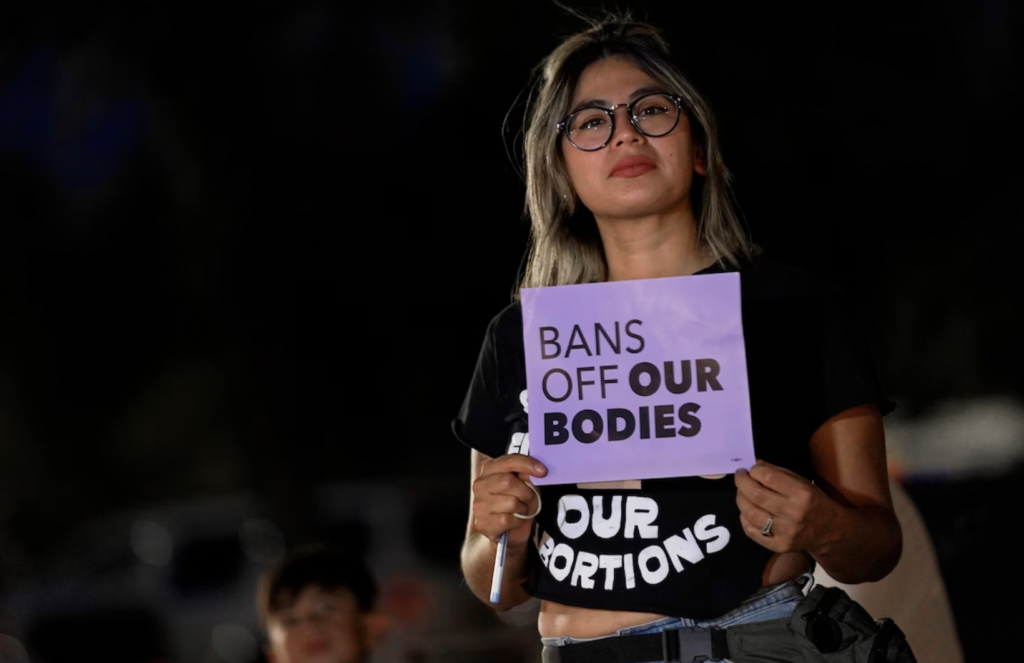
This article was originally published by The Washington Post.
By Rachel Roubein and Yvonne Wingett Sanchez
August 8, 2023 at 5:00 a.m. EDT
Major abortion rights groups are launching a bid Tuesday to enshrine abortion protections into the Arizona Constitution, setting off a high-stakes battle in a politically divided swing state that was once reliably Republican.
The effort represents the latest attempt by abortion rights groups to counteract bans in states across the country, and Arizona advocates said they believe the public is on their side. Abortion rights supporters scored major victories during last year’s midterm elections and have since begun ballot measure campaigns in a handful of Republican-led states, such as Ohio, Florida and Missouri.
Arizona for Abortion Access, the new political action committee supporting the ballot measure, is scheduled to file proposed language for a constitutional amendment with the Arizona secretary of state’s office on Tuesday — the first step in a lengthy process to put an abortion rights question before voters on the November 2024 ballot. This initiative, first reported by The Washington Post, includes the American Civil Liberties Union of Arizona, Planned Parenthood Advocates of Arizona, NARAL Arizona, Affirm Sexual and Reproductive Health, Arizona List, and Healthcare Rising Arizona.
Arizona currently bans most abortions after 15 weeks of pregnancy. Specifically, the proposed language would guarantee the right to an abortion up until fetal viability, which is typically around 22 to 24 weeks of pregnancy. It would require abortions to be permitted afterward when necessary to protect the life or physical or mental health of the patient.
“We know that there is support for that because candidates have organized their own political campaigns in the past on this and won, so we know that people will vote for the issue itself,” said Jodi Liggett, a senior adviser for NARAL Arizona.
Appealing directly to voters has emerged as a key strategy of abortion rights leaders, who have limited tools to reshape abortion access since the Supreme Court overturned Roe v. Wade last year. Such ballot measure campaigns are resource intensive. They require costly and time-consuming signature-gathering efforts, as well as significant financial backing. Liggett estimates the effort in Arizona could be “a $40 [million] or $50 million project.”
In states around the nation, campaigns to try to increase access to abortion are sure to be met with fierce opposition from antiabortion groups, which have argued that such ballot measures are “extreme.” In Ohio — the only state where abortion is on the ballot this year — both sides have already raised millions of dollars to defeat the measure, along with a separate initiative to make it more difficult to pass constitutional amendments.
In Arizona, Gov. Katie Hobbs (D), who narrowly won the 2022 midterm election partly by campaigning on a pledge to repeal a territorial-era abortion ban, is expected to emerge as a political ally of the effort. With the state legislature and many county prosecutorial offices in the state controlled by Republicans, the governor has issued an executive order that aims to prevent the criminalization of abortion. She has also expressed support in taking the issue of abortion access directly to voters.
State legislative staff is expected to review the proposed amendment’s language within the next 30 days as part of a technical review that will be requested by the group. The group has until July 3 to collect 383,923 valid signatures from registered voters across the state.
The coalition aims to collect more than a half-million signatures in an effort that could start around mid-September, said Chris Love, a senior adviser for Planned Parenthood Advocates of Arizona.
If the initiative makes it on Arizona’s ballot, it could have implications for the reelection of President Biden, who is in Arizona on Tuesday to announce the creation of a new national monument. About 62 percent of Arizona residents surveyed have said abortion should be legal in most or all cases, compared with 64 percent nationally, according to a 2022 survey by the Public Religion Research Institute, a nonpartisan group.
The initiative could help turn out independent voters, who make up about a third of the state’s electorate and who, along with some moderate Republicans, helped abortion rights candidates sweep key statewide offices in recent years.
After Roe was overturned, some Arizona clinics decided to halt providing abortions for weeks because of confusion over a near-total ban dating to the mid-19th century. That measure isn’t currently in effect, and a state appeals court ruled last year that Arizona cannot prosecute doctors under the 1864 ban.
Since late September, most abortions in the state have been banned after 15 weeks of pregnancy except to the save the life of the mother or in the cases of serious medical emergencies — the result of a law that Gov. Doug Ducey (R) signed nearly three months before the nation’s highest court struck down the constitutional right to an abortion in June 2022.
When a leaked draft in May 2022 showed a majority of the justices were poised to overturn Roe, grass-roots advocates quickly pulled together an effort to attempt to get an abortion rights measure on the November midterm election ballot. Their last-minute quest was unsuccessful.
The campaign launching Tuesday differs from last year in several key ways. For one, the state’s major abortion rights groups are involved in this effort, meaning it will probably come with significant financial support. And the groups have a much longer lead time to gather signatures.
Within the broader abortion rights movement, there have been disagreements over whether to include certain limits on the procedure in ballot measure language, such as the option to regulate abortion after fetal viability or to require minors to obtain consent for an abortion from a parent or guardian.
About 10 months ago, leaders of major Arizona abortion rights groups began discussing what a potential 2024 ballot measure campaign may look like in the state. They crafted different versions of potential language — including with and without the option to create viability limits — and pulled funding together to put polling out in the field.
“Based upon the data that we received from our polling, the language with viability was the strongest option,” Love said. “And that’s the option that we think most Arizona voters will go with and will support and will vote in favor of in 2024.”
But perhaps, not without a fight. Those who support abortion restrictions in Arizona tend to be well-organized and well-funded. They could mount an effort to place a competing initiative on the ballot, either through the initiative process or through a legislative-directed referendum.
Arizona isn’t the only state where abortion rights may be on the ballot during next year’s races for president, House and Senate. Abortion rights supporters in Republican-leaning Florida and Missouri are also pursuing measures through citizen-led petitions. And in Maryland and New York, the states’ Democratic-controlled legislatures referred the question of whether to enshrine abortion protections in the constitution to state voters.
But first, advocates on both sides are closely watching what happens in Ohio.
Abortion rights groups in the state gathered enough signatures to place a constitutional amendment guaranteeing access to abortion on the ballot this November. But beforehand, voters in the state are weighing whether that effort could become much more difficult. Ohio Republicans, who control both chambers of the state legislature, scheduled a special election for Tuesday asking voters whether constitutional amendments should require the support of 60 percent of voters rather than a simple majority.
“Arizonans have a long and proud history of using the initiative power when their elected representatives fail to do the right thing,” Andy Gaona, an attorney representing the abortion rights effort, said in a written statement. “And this Act is just the latest example.”
Abortion access in America
Tracking abortion access in the U.S.: After the Supreme Court struck down Roe v. Wade, the legality of abortion is left to individual states. The Post is tracking states where abortion is legal, banned or under threat.
Abortion pills: The Justice Department appealed a Texas judge’s decision that would block approval of the abortion pill mifepristone. The Supreme Court decided to retain full access to mifepristone as the appeal proceeds. Here’s an explanation of what happens next in the abortion pill case.
Post-Roe America: With Roe overturned, women who had secret abortions before Roe v. Wade felt compelled to speak out. Other women who were seeking abortions while living in states with strict abortion bans also shared their experiences with The Post through calls, text messages and other documentation. Here are photos and stories from across America since the reversal of Roe v. Wade.
